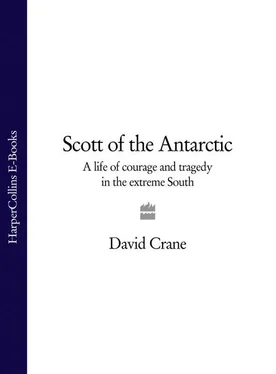On 19 October 1890 Amphion ’s tour of duty came to an end, and she weighed for Honolulu on the first stage of the long journey back to England. The weather on leaving Victoria was foul, Scott wrote to Mrs O’Reilly – ‘as regards physical discomfort some of the worst I have ever endured. We had a gale of wind with a very heavy sea, in our teeth, the motion was awful and the pangs of sea-sickness attacked us all from the captain down to the “warrant officers’ cook’s mate” (usually supposed to be the most humble individual on board). The climax was reached on the night of the Government House Ball when it blew really hard: I had the middle watch, the rain and spray dashing in one’s face made it quite impossible to see ahead, so I turned my back on it and with a sort of grim pleasure tried to imagine what was going on at the ball.’
It is interesting to catch Scott’s own voice again – if for nothing else than to be reminded of just how young he still was – and all the more so as he wrote to Mrs O’Reilly with the same unguarded familiarity with which he treated his own family. ‘The “plant” thrives,’ he went on, clearly referring to a parting gift to him, ‘& to my messmates this is a matter of supreme wonder … it is not for nothing that I have learned the elements of botany … that plant has had a treatment which I venture to suggest, no plant has ever had before; once it grew very yellow, I dosed it with iron and other tonics, gave it nitrate, sulphurite, in carefully measured proportions, to my horror it seemed to grow worse, but I persisted in my treatment and eventually it recovered and has since flourished. In fine weather I take it on deck when I go on watch but I don’t spoil it, it is not allowed too much to drink nor too much fresh air.’
On the way home Scott and his messmates raced each other in growing beards, with Scott ‘bound to confess’, he wrote, that ‘I was a bad last – a brilliant idea struck me that checking my hair proper, would help to “force” the beard, so I had my back cut with one of those patent horse-clipping arrangements: it didn’t seem to do the least much good, but it gave me a very weird appearance.’
With a long voyage ahead of them, he continued, the ‘Admiral’ (Warrender, a future admiral, so a prophetic nickname for Scott’s friend as it turned out) and Scott ‘hit on a capital method of employing this spare time’ in writing a book – ‘not a novel, but a grave and important technical work’, designed to ‘epitomise’ the various seamanship manuals into one pocket-sized volume. ‘With this great end in view, we set and lay out our places, divide into heads and sub-heads, chapters and paragraphs and generally succeed in building up scaffolding, which would contain books about three times the size of any seamanship manual in existence. At first this was amusing, but after a bit it gets quite irritating. This is of course a state secret, and naval officers must not be told what is in store for them, nor, in case of non-publication, must they know what they have missed.’
It was ten days’ sailing from Victoria to Honolulu, where a week was spent in those social and diplomatic functions dear to Captain Hulton’s heart. ‘At Honolulu we employed our time firing salutes and anathematising mosquitoes,’ Scott wrote. ‘Besides such necessary visitors as the King etc, the Captain in the fullness of his heart must needs invite calls from all the consuls and other dignitaries in the place, their name is legion and they all have to be saluted, so we are everlastingly popping off guns.’
There were other things for Scott to worry about, apart from Hulton or the mosquitoes. He had applied for a place on the Torpedo course at HMS Vernon , and as the Amphion made its slow way back to England via Hong Kong, Aden and Suez, he became increasingly anxious over his prospects. ‘I was very despondent,’ he later confessed to Mrs O’Reilly, in a letter that probably shows as well as anything what anxieties lay behind the tone of his short-lived diary, ‘on account of my small chance of being selected for this Torpedo business; after that my spirits got lower & lower; each mail brought me what I considered to be worse & worse news – I knew there were only five vacancies and every letter from home informed me of an increased number of applicants for them – the number swelled from 20 to 30 and at last to 49 – I was in despair and gave up all hope; but a day or two brought the welcome telegram informing me that I was chosen and on the 20th of June I was on my road to England – I really think if I had not been taken this year I should have gradually lost all interest in the Service – it seems such a dismal look out to go on year after year with that dreary old watch keeping, going abroad for three years and coming home for six weeks and so off again. As it is there is a great deal of interest in the speciality I have adopted and at any rate there are a certain two or perhaps three years in England.’
If Scott had been anxious, he was right to be. Ambition, for a naval or army officer of intelligence, is not an option but a necessity. Cultural traditions might dissemble the fact, but the alternative to promotion is too dire to leave any alternative. Fail to get on the right Torpedo course, fail to get a Staff College nomination, fail to get on the ‘pink list’, fail to be seen doing the right job, fall six months behind your contemporaries – and the endless vista of naval or military life in all its undifferentiated and unimaginative dullness, stagnation and impotent subordination opens up.
For a young officer without interest, ambition was even more vital. It was, alongside his talent, all he had. It was not, in any narrowing sense, a mere matter of self-interest. It was not about power, or self-promotion, or any authoritarian instinct, but about professional fulfilment – about finding the space to think and develop – the mental and physical lebensraum that the naval and military life institutionally denies to failure or mediocrity. And for Scott, as he set foot on English soil again for the first time in two and a half years, and went down to Outlands to see his ‘great stay-at-home’ of a father, it would soon be about more. It would be about survival.
Lives there the man with soul so dead, Who never to himself hath said This is mine own, my native land Whose heart hath ne’er within him burned As home his footsteps he hath turned From wandering on a foreign strand.
Sir Walter Scott,
(mis)quoted in Scott’s address book
THE TWENTY-THREE-YEAR-OLD SCOTT his family welcomed home in the summer of 1891 was not the homesick boy who had gone to sea in Amphion . In their memories of these last, unclouded months together as a family, his sisters would recall a more physically and mentally alert Con, stronger, more robust, more incisive, more curious, more navy . ‘He felt that things requiring to be done,’ Grace recollected, ‘must be well arranged, and must not attend on slower wits … matters once well considered and decided upon must not be allowed to be hampered by afterthoughts and questions. Details should be minutely arranged, then off and get it done with.’
His few surviving letters from this time convey the same impression, though the final phase of his journey home from Esquimault hardly bears it out. He had gone down with fever at Malta and been forced to miss Cannes, where the Amphion was on guard duty for the Queen, and on his recovery made his own way back by land from Brindisi. He had ‘looked forward to a few days in Paris’, he wrote to the O’Reillys, but ‘hating timetables and all those sorts of things’, had ‘attached’ himself to a civil engineer he had met, and woke up in Milan ‘where I didn’t ought to have been’ with no luggage and nothing to do but ‘console’ himself with a day in the cathedral.
Читать дальше












![John Bruce - The Lettsomian Lectures on Diseases and Disorders of the Heart and Arteries in Middle and Advanced Life [1900-1901]](/books/749387/john-bruce-the-lettsomian-lectures-on-diseases-and-disorders-of-the-heart-and-arteries-in-middle-and-advanced-life-1900-1901-thumb.webp)